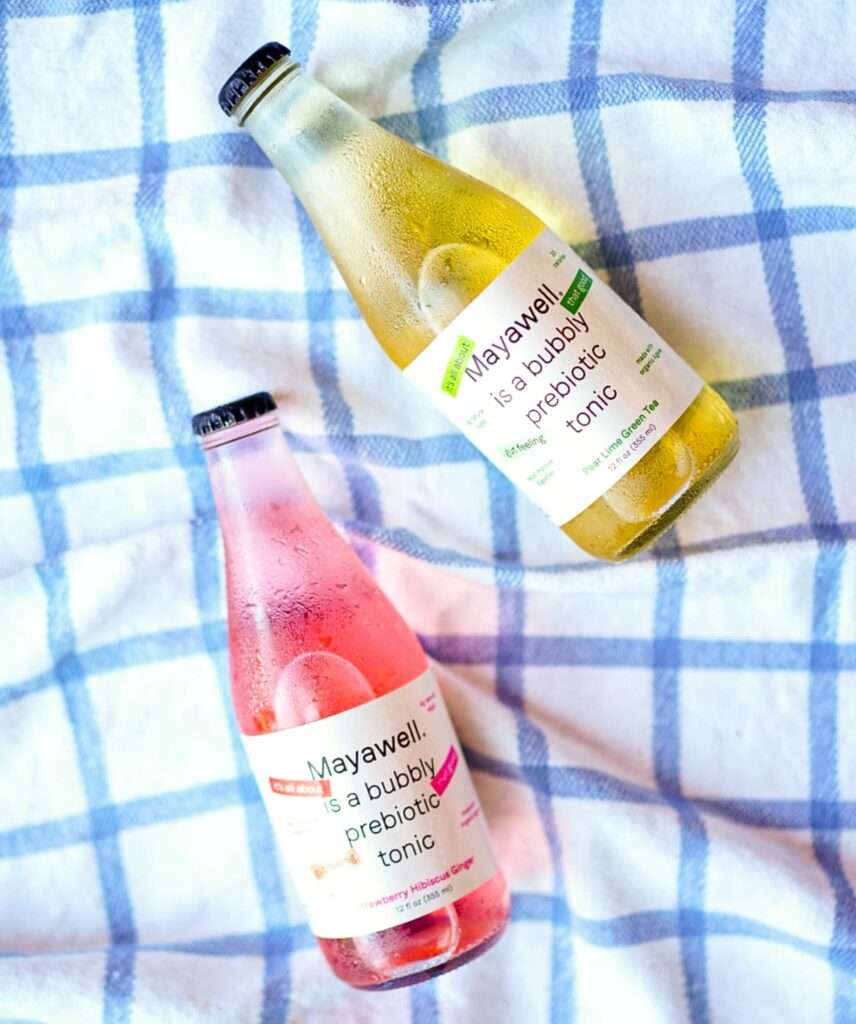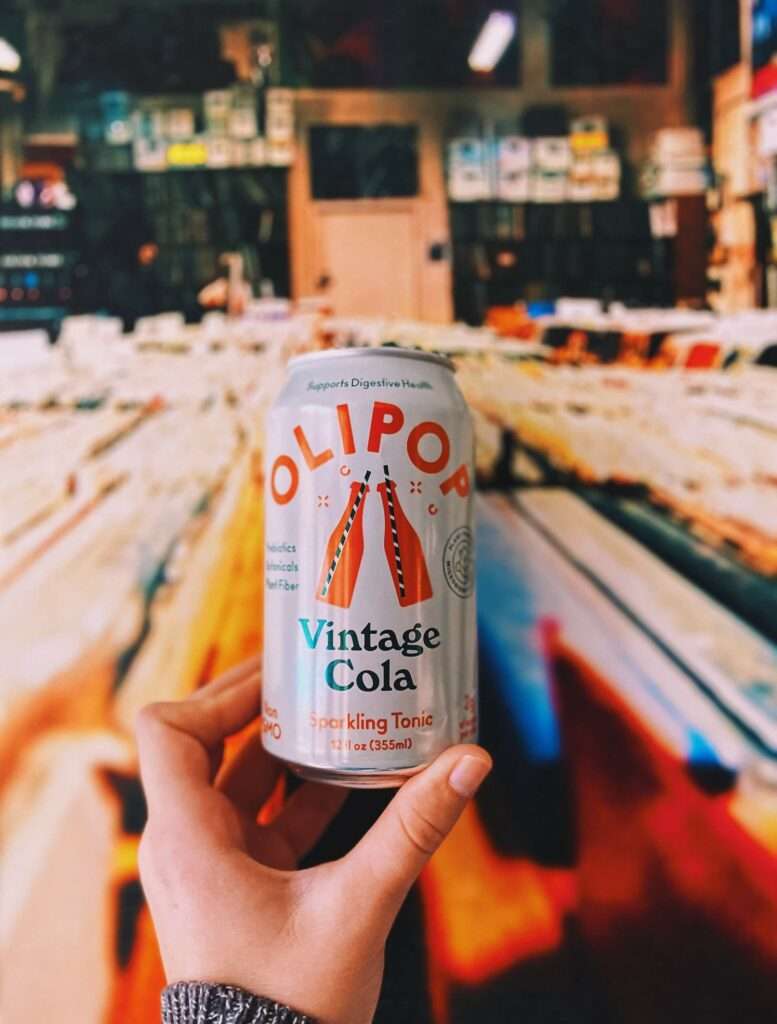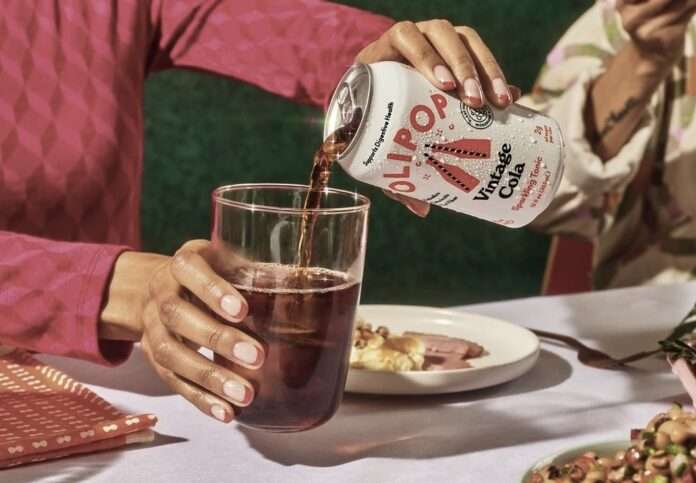Should you crack open a fizzy prebiotic soda, or do their health benefits fall flat? Experts sound off.
From carbonated aloe vera juice to drinks infused with adaptogenic mushrooms to the ubiquitous good-for-you drink, kombucha, wellness beverages have been all the rage for years. But have you tried prebiotic sodas? They’re front and center in the supermarket and convenience store coolers — brands like OliPop, Poppi, Day Trip, and Culture Pop — have taken over.
The increasing variety of prebiotic soda brands available today is indicative of the burgeoning market. Valued at $6.05 billion in 2021, market research firm Global View Research expects the global prebiotics industry to grow at a 15 percent CAGR until 2030. This begs the question: are prebiotic bubblies healthy? Are they healthier than soda? Or kombucha, for that matter? And just what are they, exactly?
What are prebiotics?
Although the terms prebiotic and probiotic may seem similar, the two have different functions in the body. “Probiotics are good bacteria that are beneficial to the gut. Prebiotics are the indigestible dietary fibers that feed the good bacteria in the gut,” Rhyan Geiger, RDN Owner of Phoenix Vegan Dietitian, tells Ethos.
Both prebiotics and probiotics are essential for overall gut health — and the well-being of the body as a whole. Without ample prebiotics, probiotics cannot function optimally, leading to a host of health problems, such as inflammation and digestive issues.

“Your gut microbiome is involved in nutrient absorption, regulating blood sugar and cholesterol levels, mood regulation, and immune functioning,” explains Samantha Cassetty, MS, RD, a plant-focused nutrition and wellness expert and co-author of Sugar Shock. “So a healthy gut puts you on the path to a healthy body and mind.”
Since the adult body is unable to create its own probiotics, they must be obtained through diet or supplementation. “All of the gut bacteria that we create naturally are done during childhood,” says Geiger. “As an adult, the best way [to obtain them] is through food or supplementation. Luckily there are a lot of options to choose from when it comes to getting adequate probiotics and prebiotics.”
Prebiotic foods that support gut health
Those adhering to a plant-based diet may have a leg — or gut — up on those who don’t largely consume plants and whole foods. That’s because several plant foods naturally contain prebiotics, such as onions, garlic, beans, apples, and wheat bread.

“However, we know that most people aren’t eating this way. Instead, 60 percent of calories in our diets come from ultra-processed foods like pizza, boxed mac and cheese, chips, and sugary cereals,” says Cassetty. “And 95 percent of Americans don’t include enough fiber in their diets. Additionally, about 90 percent of adults don’t eat enough fruits and veggies, which are abundant in prebiotics.”
Other plant-based foods that naturally contain prebiotics include Jerusalem artichoke, leeks, asparagus, flax seeds, bananas, and oats. “These foods will help feed the good gut bacteria you have,” says Geiger. Similarly, probiotics can be obtained through fermented foods like kombucha, yogurt, miso, sauerkraut, pickles, tempeh, kimchi, and sourdough bread.
Do people need prebiotics supplements?
There are no official dietary recommendations for the intake of prebiotics, according to the International Scientific Association for Probiotics and Prebiotics.
But people should consume at least three to five grams daily to reap the health benefits. (Keep in mind that high doses can cause side effects, such as gas, bloating, and diarrhea.) Since all prebiotics are dietary fibers, consuming a well-balanced diet full of fiber should suffice, without the need for added supplements.
In terms of supplements, there are several brands on the market, from Ora Organic’s Trust Your Gut Probiotic & Prebiotic Powder to Gogo’s Prebiotic Fiber Gummy. Wondering if you should be taking one? According to Cassetty, supplements like these may be helpful, but they’re not a substitute for eating healthy. “You don’t have to overhaul your diet overnight but try to set a doable goal, and when you achieve it, try another one,” she says.
Cassetty recommends introducing prebiotics into meals through easy swaps like eating fruit with your usual snack three times a week. “Eating a plant-dominant, mostly whole foods diet is the north star goal,” she adds. “But even small, simple changes are steps in the right direction.”
Are prebiotic sodas healthy?
Similar to other supplements, prebiotic sodas — carbonated drinks that contain the mighty gut boosting prebiotics — are widely touted for their health benefits. They certainly pack flavor, but what about function? Are these colorfully packaged fizzy drinks really all they’re cracked up to be?
Coke and Sprite have been out. (And Diet Coke is definitely out.) Are gut-boosting carbonated beverages laced with prebiotics in? Before you go adding them to your Instacart order, let’s first unpack their health claims.
Although the base ingredients for these drinks vary, one ingredient is usually common: added sugar.

“A can of prebiotic soda has three to five grams of added sugar compared to 39 grams of added sugar in a can of Coke,” explains Cassetty. “So, drinking a prebiotic soda instead of a sugary soda can help you reduce your added sugar intake and keep it in a healthier range.”
But the big difference between a can of prebiotic soda and your typical soft drink is the addition of high amounts of prebiotic fiber called inulin — typically from chicory. Inulin is fermented in the large intestine by microbes that help regulate blood sugar levels, inflammation, and even help control appetite.
A single can of prebiotic soda can contain up to 9 grams of fiber. While the recommended daily intake for an adult woman is 25 grams of fiber and 38 grams for men, the average American adult consumes just 16 grams per day. When a single soft drink can add more than 50 percent more fiber to your diet than you’re used to, it can cause some issues, namely gas and bloating. Research has also found that too much inulin can increase inflammation.
All in all, Cassetty says forgoing sugary drinks in favor of prebiotic sodas is a step in a healthier direction, though. But like with anything, moderation is key.
“But suppose you’re drinking a prebiotic soda as a shortcut instead of working on eating better. In that case, I’d recommend taking steps to eat more fiber-rich foods and plant foods and reducing heavily processed foods, added sugars, and sugar substitutes,” she says.
“Prebiotic drinks may not have any advantage, and they’re expensive, so you’re paying for something that might not be necessary.” she continues. “Instead, your food dollars could be better spent on more proven methods to boost gut health, such as eating more fiber-filled plant foods and fermented foods.”
When in doubt, consult with your physician first. “I always recommend that everyone check with their doctor before starting or changing their supplement regime,” says Geiger. “Checking with your doctor can ensure you are taking the correct supplements for you.”
Prebiotic soda brands
Looking to give prebiotic sodas a try? Look for these brands the next time you visit a supermarket or health food store.
- Poppi: Known for its wide range of flavors and affordability, Poppi sodas contain apple cider vinegar and offer health benefits such as lower sugar and calorie content. Some of the flavors include Strawberry Lemon, Raspberry Rose, and Classic Cola. You’ll find Poppi at an increasing number of supermarkets and health food stores like Whole Foods Market.
- Olipop: This brand stands out for its classic soda flavors and high fiber content. Olipop uses chicory root as its prebiotic source and offers flavors like Cherry Vanilla, Ginger Lemon, and Vintage Cola. It’s appreciated for its low sugar and fairly low-calorie count. Olipop is one of the most widely available prebiotic soda brands.
- Wildwonder: Offering a unique range of flavors like Peach Ginger and Guava Rose, Wildwonder combines prebiotics and probiotics. The brand is known for its creative flavors that closely match its names, and it operates as a minority- and woman-owned business.
- Gist: This brand is ideal for those looking for prebiotic sodas with no sugar or sweeteners. Gist offers flavors like Chamomile Rosemary and Ginger with Rooibos, and is known for its herbal botanicals and zero sugar content.
- Health-Ade Pop: Previously known as Health-Ade Booch Pop, this brand offers organic prebiotic pops made with real juice and sweetened with cane sugar and monk fruit. Flavors include Lemon Lime, Pomegranate Berry, and Ginger Fizz.
- Mayawell: Co-founded by Vincent Reyes, Mayawell sodas are made with organic active agave and offer unique flavors like Pear Lime and Raspberry Cucumber. These sodas are known for their interesting flavors and low sugar content.
- De La Calle Tepache: Producing a traditional Mexican brew called tepache, De La Calle offers a fermented, sparkling drink with probiotic and prebiotic qualities. Their organic line of tepache includes flavors made from fruits like pineapple, oranges, and guavas.
- Turveda: This brand offers sodas developed by gastroenterologists, with flavors like Lemon, Turmeric and Ginger, and Ashwagandha, Lavender and Vanilla. Turveda is known for combining the benefits of prebiotic sodas and wellness shots in one can.
- Daytrip These sodas are infused with a proprietary blend of botanical terpenes, elderberry, and 5 grams of clean prebiotic fiber sourced from organic agave. These beverages are not only USDA Organic certified but also vegan, gluten-free, and have only 30 calories per can. Daytrip aims to boost the mind-gut connection with their product, providing 100 percent of the daily recommended vitamin C in each can. Some popular flavors include Berry Citrus, Clementine, and Grapefruit Lime.
- Culture Pop This brand stands out for its combination of billions of live microorganisms, Bacillus Subtilis, in its sodas, offering a probiotic benefit. The sodas come in flavors like Strawberry and Rhubarb, Orange Mango, and Wild Berries and Lime, and are known for having only 8 grams of sugar and 45 calories per can.
Related on Ethos:


